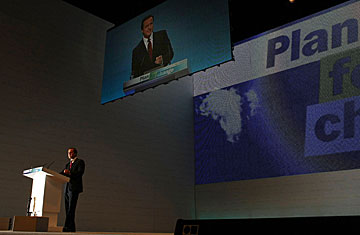
Conservative Party leader David Cameron addresses delegates on the current financial crisis during the Conservative party conference in Birmingham, England.
If he achieves his ambition to become Britain's Prime Minister — and opinion polls suggest he is on course to do so — Conservative leader David Cameron promises a new candor in relations with Washington. The Labour government, he says, has tended to flatter Britain's allies across the Atlantic rather to deliver helpful home truths. But as he considered the sorry sight of a Congress unable to agree on measures to avert a global financial meltdown, it's just as well that Cameron spared U.S. politicians his unvarnished opinions, which would have been anything but pretty.
The ructions in Washington and Wall Street stole the headlines from the Conservatives' annual conference, held this year in Birmingham, Britain's unlovely second city. The Labour party, divided and unpopular, had held their own yearly get-together the week before. It managed a show of unity behind beleaguered Prime Minister Gordon Brown, securing a boost in the polls that halved the Tories' lead from 20 points to 10. Cameron and his colleagues planned to use their conference to win back the initiative and the limelight. That chance was torpedoed when the House of Representatives rejected the bailout package on Sept. 29 — the exact midpoint of Tory's five-day conference.
In a change to the published conference schedule, Cameron appeared on stage the next morning to pledge to work with his Labour opponents to expedite legislation enabling the Bank of England to rescue failing banks. He also promised further protections for bank customers and a concerted attempt to break the vicious cycle reducing banks' ability to lend. And he warned against the partisan rancor that derailed the U.S. bailout. "Let's not allow the political wrangling and point-scoring that we've seen in America to happen here in our own country," he said.
Despite surveys that show a rise of anti-American sentiment in recent years, many Britons still love America, and the British political classes invest great importance in their country's "special relationship" with the U.S. Still, it's safe to say that the sharp sense of disappointment expressed by Cameron isn't uncommon. "The past eight years have been dominated by the troika of Bush, Rumsfeld and Cheney, who have become increasingly unpopular in Europe," says Brooks Newmark, an American-born Conservative MP. He's an enthusiast for John McCain, who has cultivated close links with British Conservatives and addressed their conference in 2006. Newmark admits, however, that grassroots Tories tend to favor Barack Obama because of British disenchantment with the Bush administration. "If you want a candidate who symbolizes change, Obama is the natural choice," he says.
Even before the U.S. economic crisis gate-crashed the Conservative conference, delegates were already exhibiting symptoms of an imported disease: American election fever. Like hypochondriacs spotting a doctor, they swooped on anyone who might be able to give them an authoritative prognosis. Conference fringe meetings featuring representatives from the Republican and Democratic parties drew capacity crowds. Tory MPs who had traveled to the conventions in Denver and Minneapolis gave starry-eyed accounts of the proceedings. Francis Maude, a member of the shadow cabinet, described himself as having been "one of Obama's 85,000 close friends in Denver" — but refused to reveal his personal preference for U.S. President.
Many Tories weren't so circumspect. Some wore pins and badges and T-shirts declaring their allegiance. Eleanor Laing, a Tory MP, appeared as the theoretically impartial chair of a debate about the U.S. elections sporting a sequined jacket decorated with stars-and-stripes and G.O.P. elephants. Talk at the many social events around the conference was dominated by the contest. "I rather like Sarah Palin," confessed one immaculately coiffed Conservative dame, as she waited in the powder room queue. "How can you say that?" interjected her neighbor. "That Palin woman is simply terrifying."
Amid such genteel disagreements, there was one point of unanimity: the economic crisis will have profound political repercussions on both sides of the Atlantic, but it's hard to anticipate exactly what these will be. Certainly it's unclear whether voters in either country will take revenge on incumbent parties for their part in the mess or will shy away from younger challengers, preferring to put their trust in political veterans. It's the second scenario that Ed Cox, who heads up McCain's campaign in New York, told delegates in Birmingham he expects will give his candidate the edge. "This is a time for experience," he said.
That message unsettles Tories. Their leader turns 42 on Oct. 9 and has only ever served as an opposition MP. "To do difficult things for the long term, or even to get us through the financial crisis in the short term, what matters more than experience is character and judgment," Cameron told delegates in his closing address to the conference. "I believe that to rebuild our economy, it's not going to take more of the same, it's going to take change ... Experience is the excuse of the incumbent over the ages. Experience is what they always say when they try to stop change." Worryingly for Cameron, British voters have often proved susceptible to exactly that argument, especially at times of crisis. Among the casualties of America's turbulence may be Cameron's hopes of an easy stroll into 10 Downing St.
